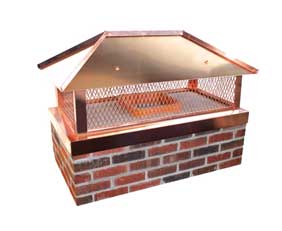People enjoy the benefits of a warm fire emitting from their masonry fireplaces. When the family is not huddled around the fire, birds and other small animals may create a home in the chimney. By installing a chimney cap, these creatures and water will not be able to enter the chimney and cause damage.

When rain water penetrates a masonry chimney, it can eat away at the brick and mortar. The homeowner may not realize that structural integrity of the chimney is affected until the exterior begins to crumble. At this point, repairs tend to be costly and in the most severe cases, chimney replacement may be the only option. This process is complex, time-consuming, and quite expensive.
Water residing in the chimney can lead to a musty smell in the house. Capping the chimney prevents water from intruding so the home will smell fresh. A cap also prevents burning embers from rising from the chimney and landing on the roof or in the yard. Each year, many fires are caused by this situation when they could have easily been prevented with an inexpensive chimney cap.
When small animals such as birds see an open hole in the home, they view it as a safe haven. A chimney is the perfect place to nest and raise their young because it is sheltered. Birds like the chimney swift make a habit of living in chimneys. Chimney-dwelling animals can perish when the homeowner uses the fireplace connected to an uncapped chimney.
These should be reasons enough for anyone to have a chimney cap installed. A professional can do this at minimal cost within an afternoon. Selecting the proper type and size of cap is important so it is best to have an expert perform this job. With a cap on the chimney, the home, its occupants, and wildlife will be much safer.
